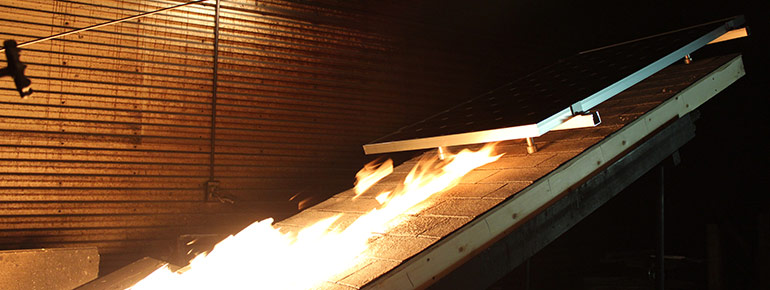Photovoltaic Panel and Module Fire Resistance Testing

18 Aug 2015
What you should know about testing under recently revised standards
for more than a decade, ansi/ul 1703 has been the safety and regulatory standard to certify the fire resistance of flat photovoltaic (pv) solar panels and modules. however, field failures and cases where fire had a different impact on the roofing structure than anticipated, led to an update in fire resistance testing and classification requirements for systems not integrated into the building structure itself. these changes took effect on january 1 of this year in california and will be in place for the rest of the country by 2016, if not sooner.
the revised version of ansi/ul 1703 no longer bases the fire rating on the pv module alone, but on a combined "system rating" as defined by the pv module type, as well as the racking/mounting system. under the revisions, individual panels will be required to obtain a classification "type" based on construction review and testing. systems, which include the pv module, mounting system and roof covering, will be tested together. modules combined with mounting or racking systems then receive a fire rating, denoted by class a, b, or c.
testing requirements vary based on the roof's slope (where low slopes are less than 2:12 and steep slopes are greater than or equal to 2:12). the roof's composition is accounted for in the fire-resistance testing set up, and depending on the desired maximum slope for installation of the pv system, the appropriate combination of spread of flames tests and burning brand tests will be conducted. the rack and panel system must show that it will not degrade the original fire rating of the host roof, therefore the pv system will need to have an equal or greater fire classification than the roof it is installed upon.
solar panel manufacturers must be prepared to have panels tested and to redesign and re-evaluate products that may present safety concerns or not pass fire-resistance testing to ensure full compliance. after getting a panel type tested, understand which rack systems and installations are compatible with your type. the same can be said for the racking manufacturers. in general, familiarize yourself with the products and new technologies in the mounting and roofing product industries to ensure compatibility with pv panels.
testing and certification experts have the knowledge and experience to assess pv technology to current standards and are often looking ahead to new technological developments and changes in the industry. experts on solar panels and the building materials used in roofing installations can be an asset to the design stages, ensuring the best materials and product design to help mitigate risks like flammability. these groups can often review, test and certify products more quickly, given their expertise and knowledge of the industry. partnering with a nationally recognized test laboratory and/or a cb testing laboratory (cbtl) can help ensure a product's safety and get them to market faster.
the changes to ansi/ul come at a time when customers are increasing their demand for solar power. this potential opportunity for the industry is coupled with the challenges of new standards, making that testing and certification more important than ever.
for more information on pv panel testing, download our white paper or listen to our webinar recording.

